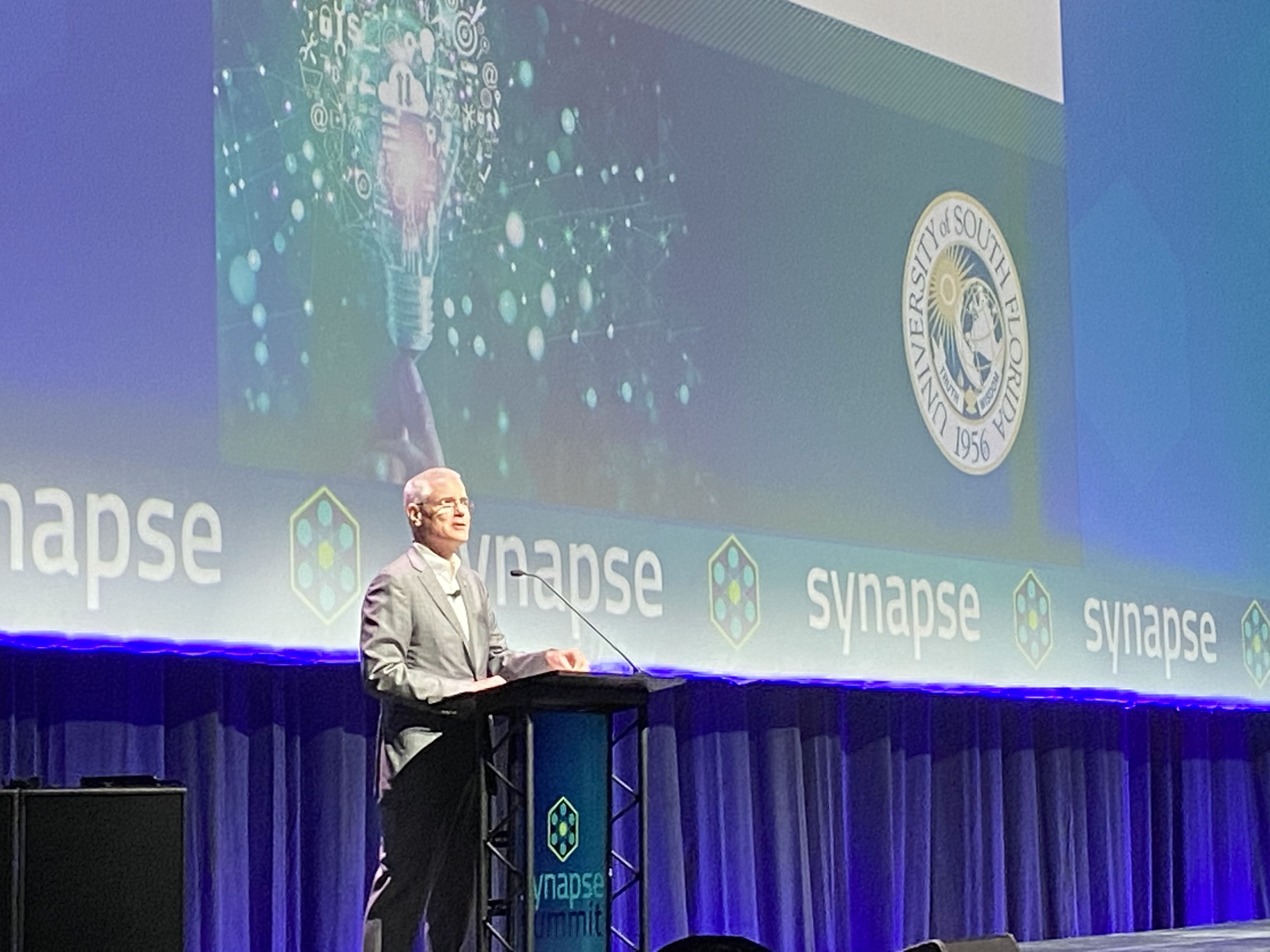USF president Currall targets entrepreneurs, innovative partners at Synapse Summit

USF President Steven Currall was a keynote speaker at Synapse Summit 2020 on Tuesday at Amalie Arena and talked about the importance of collaborating with government officials and entrepreneurs as a university to advance the ecosystem of innovation.
Synapse Summit 2020 is a two-day annual conference held in Downtown Tampa and run by the nonprofit organization Synapse Florida, which connects entrepreneurs, investors and other stakeholders. The conference drew over 6,000 attendees, 350 speakers, 300 exhibitors and 70 sessions that attendees visited, according to Synapse’s website.
As a keynote speaker, Currall took the stage to discuss USF’s future impact on the surrounding economy.
“Every university does research, creative activities, teaches and public service,” Currall said in an interview with The Oracle. “I think the University of South Florida should also have, as part of its public mission, to be an engine of regional economic development.”
The summit hosted many business leaders and other individuals who seemed to be hungry for new projects and collaborations. Many start-up businesses and projects had booths set up throughout the arena giving out promotional items to attendees.
“I think that part of our role as a great research university is to engage with groups like Synapse to facilitate that collaboration across boundaries between university, entrepreneurs and government officials as well,” Currall said in the interview with The Oracle. “This is a great place to do it.”
Currall highlighted that Florida has been progressive in terms of university investments, however on a global scale, the U.S. has been surpassed by foreign businesses in the number of patents they’ve acquired within the last decade.
“From 2007 to 2008, the foreign patents actually began to exceed United States patents and that was a pivotal time in the innovation landscape where other countries are developing their own ecosystems,” Currall said. “We need to recognize their success and be mindful on how to compete.”
Knowing the U.S. is falling slightly behind, Currall suggested a way to facilitate collaboration in the community. He referenced his book, “Organized Innovation: A Blueprint for Renewing America’s Prosperity,” in which he and his co-authors looked at several case studies to examine positive effects of university interdisciplinary research centers and how they can act as a meeting ground for governments and businesses to come together and advance innovation.
Interdisciplinary research is a common theme seen throughout USF. The Judy Genshaft Honors College Dean, Charles Adams, wrote in Mosaic Magazine that USF students are challenged to think on a complex level and encouraged to work together regardless of major and background.
“Our students learn to appreciate the way the complex problems facing their generation require solutions that draw on a broad array of expertise and viewpoints,” Adams said. “As they work together, they learn to respect ways of seeing and doing very different from their own.”
Interdisciplinary studies and research involve looking into a subject from more than one branch of knowledge. Currall spoke about his experience in interdisciplinary research and how he believes students can benefit from learning different perspectives to solving an issue.
For example, in the Judy Genshaft Honors College, students are involved in conference-like classrooms where students of different majors are encouraged to talk among each other and carry a conversation pertaining to a specific topic. The goal of these conversations is to broaden one’s perspective and challenge your typical way of thinking.
“I’ve been doing [interdisciplinary research] my whole career and I find it fascinating to learn about different perspectives, paradigms, theories and methodologies from other fields,” Currall told The Oracle. “Some of that involves developing a common language, those who train in one field might not know the language in another field. The ability for those to understand common terminology and language and for there to be people who bridge the boundary and actually people who operate at that interface and help facilitate the permeability.”
Currall closed his speech by reiterating his goals of educating regional entrepreneurs and investors about USF and helping the university collaborate more with community businesses.
“We want to be your partner,” Currall said. “We are eager to expand those boundaries.
“We are ready to meet with you.”






